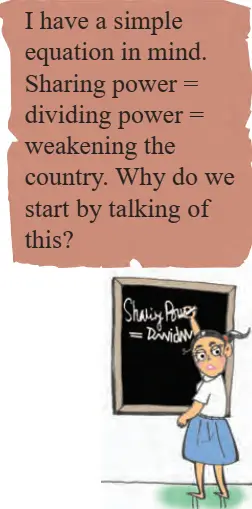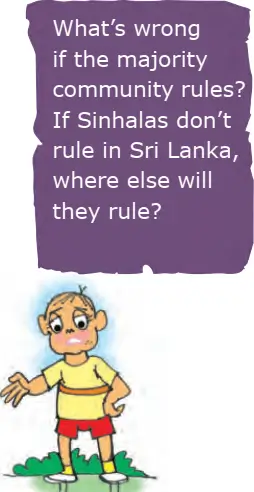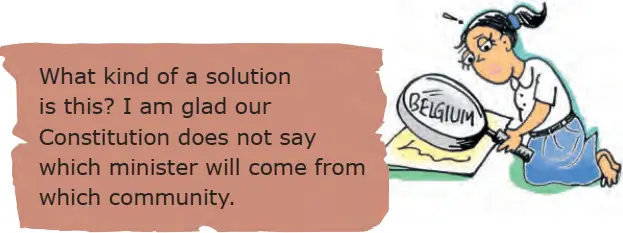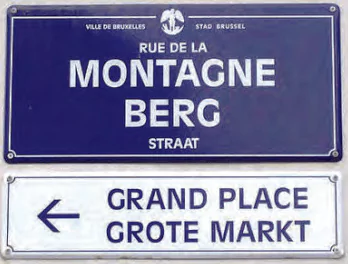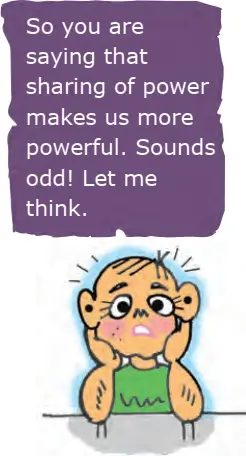NCERT Solutions Class 10 Social Science Chapter 1 Power Sharing
NCERT Solutions for Social Science Class 10 Political Science Chapter 1 – Power-sharing contain the solutions to the In-chapter questions and exercises given in the Political Science book – Democratic Politics-II. In this chapter, students will mainly find questions related to the vertical division of power-sharing among different levels of government. These NCERT Solutions provide the answers to all questions in a simple and easy-to-understand way. Attempting these answers in the exam will surely help the students in scoring high marks.
NCERT Solutions
Intext Questions
Question.1.
Ans. Sharing of power does not always mean weakening the country. Sometimes, it may create the problem by delaying decisions which are for the welfare of the people but many times it creates the possibilities of better decision making.
- It ensures that people coming from different spheres have ‘say’ in the government.
- It also ensures that maximum people can participate in the government making decisions more democratic.
- It also helps in reducing conflict between different social groups hence, making the country more powerful.
Question.2. 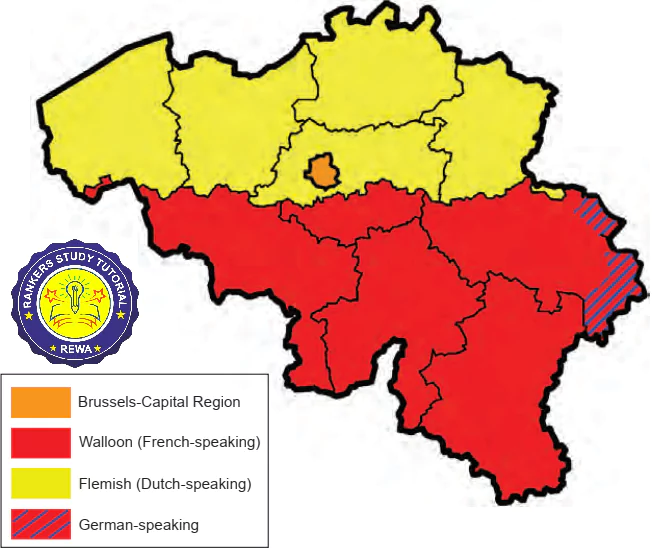
Ans. In the case of Belgium, there are two major linguistic groups:
(1) French speaking people and
(2) Dutch speaking people.
Most of the French speaking people live in the Wallonia (Northern) region while Dutch speaking people live in the Flemish (Southern) region. The capital city has a ratio 4 : 1 of the French and Dutch speaking people. The German speaking people live in the eastern Belgium.
In Sri Lanka, Sinhalese cover a wider region. Except for the northern and eastern central region and a small region in the southern Sri Lanka, Sinhalese live throughout the country. Sri Lankan Tamils are concentrated in the northern and eastern coastal region. Indian Tamils are concentrated in the northern, central and southern regions. Muslims have sporadic distribution throughout the country.
Question.3.
Ans. In democracy, it is a known fact that the government is run by the majority.
But majority does not mean only the majority in numbers based on religion or community. In its true sense, majority means majority of opinion. Sometimes, majority community may also have part in majority opinion. So, if majority rule is based on opinion it is never a problem to minorities.
Of course, Sinhalas form the majority community of Sri Lanka and it should have bigger share in the government. But, it does not mean that other’s do not get proper representation. If it is so, it will not be a true democracy.
Question.4.
Ans. Yes, the Constitution does not say which minister will come from which community; this is because of secularism. Secularism means that there will be no role of religions, community in the work of the country. Our constitution has given the ideas of equality, fraternity and brotherhood. It was in the ancient times, leaders would come from communities. Our India is a democratic country and it has proclaimed itself as a secular country. Our India doesn’t want to disrespect the other religions.
The Photograph here is of a street address in Belgium. You will notice that place names and directions in two languages-French and Dutch.
Question.5.
Ans. Yes, sharing of power makes us more powerful. But in fact it strengthens and creates a unity between the institutions involved. It may appear to be insensible as sharing means dividing and dividing means weakening.
Advantages of power sharing are:.
- It is very effective in the long run as chances of disputes and conflicts among majority and minority is lowered.
- It maintains stability in the political order by balancing power distribution.
- It ensures democracy in a country as powers are distributed.
- It reduces conflicts between diverse social groups and communities.
- It helps in maintaining a balance of power between the different organs of the government and reduces concentration of power in single organ or body.
Question.6. Read any newspaper for one week and make clippings of news related to ongoing conflicts or wars. A group of five students could pool their clippings together and do the following:
- Classify these conflicts by these conflicts. How many of these are related to power sharing disputes?
- Which of these conflicts could be resolved by working out power sharing arrangements?
Ans. With the help of the teacher, group them according to the nature of the news and find their solutions from the perspective of Belgium and Sri Lanka. Other solutions can also be found according to the circumstances.
Let us Revise
Question.1. Annette studies in a Dutch medium school in the northern region of Belgium. Many French-speaking students in her school want the medium of instruction to be French. Selvi studies in a school in the northern region of Sri Lanka. All the students in her school are Tamil speaking and they want the medium of instruction to be Tamil. If the parents of Annette and Selvi were to approach respective governments to realize the desire of the child who is more likely to succeed? And why?
Ans. The parents of Annette are most likely to succeed as in Belgium, the community government is elected by the people belonging to one language communityDutch French or German speaking. This government has the power regarding cultural, educational and language related issues.
Whereas the parents of Selvi may not get succeeded in Sri Lanka. Here education is taken care of by the central government. And for common people, it is almost impossible to consult the central government and solve such a problem.
Question.2. 
If you had the power to rewrite the rules in Lebanon what would you do?
Ans. As per Abraham Lincoln, democracy is a government “of the people by the people and for the people”. But it doesn’t mean to make a situation that can cause disturbances and blood sheds in the society. It is based on “live and let live”. So if there is an agreement among different communities to the country on the basis of fixed power sharing among them, it is right. There is no need to rewrite the rule.
Question.3. Would you adopt the ‘regular’ rules followed everywhere, as Khalil suggests? Or stick to the old rules? Or do something else?
Ans. In Lebanon, sticking to the agreement is giving Universal franchise. If the rules of the Lebanon is providing all the people to caste vote and contest elections as per agreement of power sharing among different communities, I would not adopt the ‘regular’ rules followed everywhere, as Khalil suggests. I would stick to the rules made after agreement among different communities. I don’t need to do something else.
Question.4. Recently some new laws were made in Russia giving more powers to its president. During the same time the US president visited Russia. What according to this cartoon, is the relationship between democracy and concentration of power? Can you think of some other examples to illustrate the point being made here?
Ans. Democracy is for the people by the people and of the people. Democracy, in general represents the will of the common people. But when the power is concentrated in a particular hand, in a democratic government, this individual outlasts the will of the common people. In the cartoon same situation has been shown where democracy is run by a few people, power is concentrated in their hands and they act according to their will without considering the welfare of the general people.
Other bad examples of democracy are: Pakistan, there is an elected democratic government but this is not the true representation of the will of the people. Once elected, the power- carrying men run the government as per their wishes. Iraq was another example where democracy was being run in an autocratic manner.
Question.5. 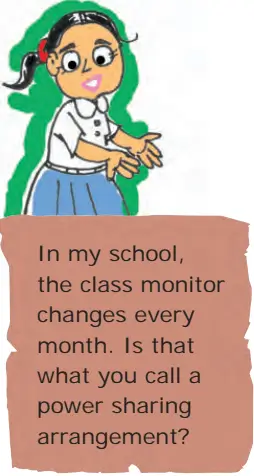
Let us Revise
Question.1. Here are some examples of power sharing. Which of the four types of power sharing do these represent? Who is sharing power with whom?
Ans.
1. The Bombay High Court ordered the Maharashtra state government to immediately take action and improve living conditions for the 2,000-odd children at seven children’s homes in Mumbai.
- This is an example of power sharing among different organs of the government.
- Here the power is shared between the judiciary and the executive.
2. The government of Ontario state in Canada has agreed to a land claim settlement with the aboriginal community. The minister responsible for Native Affairs announced that the government will work with aboriginal people in a spirit of mutual respect and cooperation.
- This is an example of sharing of power among different social groups.
- Here, the power is shared between the aboriginals and other social groups.
3. Russia’s two influential political parties, the Union of Right Forces (SPS) and the liberal Yabloko movement agreed to unite their organizations into a strong right- wing coalition. They propose to have a common list of candidates in the next parliamentary elections.
- Political parties pressure groups and movements control or influence power.
- Here, the power is being shared between SPS and the liberal Yabloko movement. This is an example of power sharing arrangements in the way.
4. The finance ministers of various states in Nigeria got together and demanded that the federal government should declare its sources of income. They also wanted to known the formula by which the revenue is distributed to various state governments.
- This is an example of power sharing among governments at different levels.
- Here, the power is being shared between federal and state governments and also among the state governments.
TEXTBOOK EXERCISE
Question.1. What are the different forms of power sharing in modern democracies? Give an example of each of these.
Ans.
- Power-sharing among the different organs of government (Horizontal power-sharing): Power is shared among the different organs of the government such as the legislature, executive, and the judiciary in a democratic government. In this kind of power-sharing arrangement, one can exercise unlimited powers in their own sphere. Each organ has its own powers, and it can also check the powers of others. So this results in a balance of power among the various institutions. This is called the horizontal distribution of power because it allows different organs of the government placed at the same level to exercise different powers.
- Power-sharing among governments at different levels: Under this, people choose separate governments at separate levels, for example, a general local government for the entire country and local governments at the provincial, sub-national or regional levels. Such a general government for the entire country is usually called a Federal government.
- Power-sharing among different social groups: In countries like Belgium where multi ethnic societies exist, power is also shared among social groups such as the religious and linguistic groups. ‘Community government’ in Belgium is a good example of this arrangement. In some countries, there are constitutional and legal arrangements whereby socially weaker sections and women are represented in the legislatures and the administration.
- Power-sharing among political parties, pressure groups, and movements: Democracy provides citizens with a choice to choose their rulers. In a democracy, power is also shared among different political parties, pressure groups, and movements. This chance is provided by the various political parties, who contest elections to win them. In democracy, such competition ensures that power does not remain in one hand.
Question.2. State one prudential reason and one moral reason for power sharing with an example from the Indian context.
Ans.
- Prudential reason: Power-sharing reduces the concentration of power in the hands of few and provides decision making power to others which helps to reduce the possibility of conflict between social groups, Social conflict often leads to violence and political instability, power-sharing is a good way to ensure the stability of political order, Imposing the will of the majority community over others undermine the unity of the nation as has happened in Sri Lanka, The tyranny of the majority is not just oppressive for the minority, it can be troublesome to majority as well.
For example, in India seats in the assemblies and parliament have been reserved. This arrangement is meant to give space in the government and administration to diverse social groups. In addition to this minorities have been granted special fundamental rights. - Moral reason: The moral reason for power-sharing in democracy is to uplift its true spirit. The word democracy itself signifies that ‘Demos’ means people. Since all the people are affected by the policies of the government, they should be consulted in the governance of the country, they should be allowed to participate in the decision-making process, it is the basis of democracy.
A true democratic government is one where citizens participate and acquire a stake in the system. Thus, moral reasons emphasize the very act of powersharing as valuable. In India, people elect their representatives every five years or earlier. People have also been granted the right to information, another move towards democratic society.
Question.3. After reading this chapter, three students drew different conclusions. Which of these do you agree with and why? Give your reasons in about 50 words.
Thomman: Power sharing is necessary only in societies which have religious, linguistic or ethnic divisions.
Mathayi: Power sharing is suitable only for big countries that have regional divisions.
Ouseph: Every society needs some form of power sharing even if it is small or does not have social divisions.
Ans. Power sharing in some form is a necessity in every society even if they are small or do not have social divisions because:
- Some power: sharing is always needed to give voice to all, and representation to all the members of the country.
- Power: sharing solutions are adopted to maintain stability in the system, and peace among various groups to ensure the smooth functioning of the system, irrespective of the size of the country.
Question.4. The Mayor of Merchtem, a town near Brussels in Belgium, has defended a ban on speaking French in the town’s schools. He said that the ban would help all non-Dutch speakers integrate in this Flemish town. Do you think that this measure is in keeping with the spirit of Belgium’s power sharing arrangements? Give your reasons in about 50 words.
Ans. The ban defended by the Mayor of Merchtem is not in line with the spirit of Belgium’s power sharing arrangements. The ban ignores the regional differences and cultural diversities. As 59 per cent of the population in the Flemish region speaks Dutch, the ban on speaking French in the town’s schools would prevent French and Dutch speakers to mingle with each other, and also create feelings of distrust and suspicion.
It is against the spirit of accommodating every linguistic group, and creating a right environment for everyone to live. This ban can possibly create division of the community on linguistic lines.
Question.5. Read the following passage and pick out any one of the prudential reasons for power sharing offered in this.
“We need to give more power to the panchayats to realise the dream of Mahatma Gandhi and the hopes of the makers of our Constitution. Panchayati Raj establishes true democracy. It restores power to the only place where power belongs in a democracy – in the hands of the people. Giving power to Panchayats is also a way to reduce corruption and increase administrative efficiency. When people participate in the planning and implementation of developmental schemes, they would naturally exercise greater control over these schemes. This would eliminate the corrupt middlemen. Thus, Panchayati Raj will strengthen the foundations of our democracy.”
Ans. Power sharing to local self governments strengthens democracy. In this way power sharing will help to reduce the possibility of conflicts among different social groups in the village. There will be no violence and political stability will be established. As a result of it there will be peace and the village may make progress in different fields.
Giving power to Panchayats is also a way to reduce corruption and increase administrative efficiency. When people participate in the planning and implementation of developmental schemes, they would naturally exercise greater control over these schemes. This would eliminate the corrupt middlemen. Thus, Panchayati Raj will strengthen the foundations of our democracy.
Question.6. Different arguments are usually put forth in favour of and against power sharing. Identify those which are in favour of power sharing and select the answer using the codes given below? Power sharing:
A. reduces conflict among different communities
B. decreases the possibility of arbitrariness
C. delays decision making process
D. accommodates diversities
E. increases instability and divisiveness
F. promotes people’s participation in government
G. undermines the unity of a country
(A) A B D F
(B) A C E F
(C) A B D G
(D) B C D G
Ans. (a) A, B, D, F.
Question.7. Consider the following statements about power sharing arrangements in Belgium and Sri Lanka.
A. In Belgium, the Dutch-speaking majority people tried to impose their domination on the minority French-speaking community.
B. In Sri Lanka, the policies of the government sought to ensure the dominance of the Sinhala-speaking majority.
C. The Tamils in Sri Lanka demanded a federal arrangement of power sharing to protect their culture, language and equality of opportunity in education and jobs.
D. The transformation of Belgium from unitary government to a federal one prevented a possible division of the country on linguistic lines.
Which of the statements given above are correct?
(A) A, B, C and D
(B) A, B and D
(C) C and D
(D) B, C and D
Ans. (D) B, C, and D.
(A) is incorrect: In Belgium the power sharing problem arose because the Dutch-speaking people constituted a majority in the country, but a minority in the capital.
Question.8. Match List I (forms of power sharing) with List II (forms of government) and select the correct answer using the codes given below in the lists:
| List I | List II |
|---|---|
| 1. Power shared among different organs of government | (A) Community government |
| 2. Power shared among governments at different levels | (B) Separation of powers |
| 3. Power shared by different social groups | (C) Coalition government |
| 4. Power shared by two or more political parties | (D) Federal government |
Ans. (C) 1-B, 2-D, 3-A, 4-C.
Question.9. Consider the following two statements on power sharing and select the answer using the codes given below :
A. Power sharing is good for democracy.
B. It helps to reduce the possibility of conflict between social groups.
Which of these statements are true and false?
(A) A is true but B is false
(B) Both A and B are true
(C) Both A and B are false
(D) A is false but B is true
Ans. (B) Both A and B are true.

